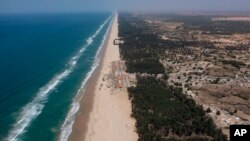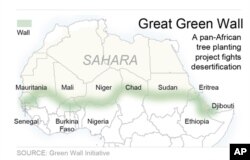African nations along the coast of the Indian Ocean hope they can borrow money for rebuilding and conservation efforts.
They are planning to offer what they are calling “blue bonds” to companies and investors. A bond is a lending agreement in which the borrower agrees to pay back the money with interest.
The United Nations says the money is needed because many wealthy nations have not followed through on promises to pay for projects to fight the effects of climate change.
Some of Africa’s eastern nations hope that private investment will pay for projects that could help boost the economies of coastal communities, protect the environment, and prepare for bad weather and other effects of climate change.
The project is being called the Great Blue Wall. It is similar to another idea, Africa’s Great Green Wall plan. The Green Wall project is supposed to help create a barrier of trees and agricultural areas that will protect soil and keep the Sahara Desert from expanding. The Green Wall plan stretches from East to West Africa along the southern edge of the Sahara Desert.
Discussions about the Great Blue Wall came as the U.N. held a forum on sustainable development from July 5 to 15 in New York City.
The bond plan means that people who invest in financial markets can help pay for the projects. If the bonds are successful, the investors will make a profit.
Jorge Familiar is Vice President of the World Bank. He called blue bonds “a powerful example of the critical role that the capital markets can play in supporting sustainable objectives.”
The Great Blue Wall plan started last year during the U.N.’s climate change conference in Glasgow, Scotland. The goal is to create protected areas along the coast of 10 western Indian Ocean nations.
Supporters of the plan hope it will restore and conserve millions of hectares of ocean, capture 100 million tons of carbon dioxide and help 70 million people get regular work.
The project goes from Somalia in the north to South Africa. It also includes island states like Madagascar and the Seychelles.
Jean-Paul Adam is the head of the climate division at the U.N.’s Economic Commission for Africa. He said the plan will recognize the value of the environment in “future wealth creation and empowerment of local communities.”
Adam said right now less than one percent of blue and green bonds are issued for projects in African nations.
He said African nations need to be able to offer more bonds in financial markets, calling it a “next step.”
The African Development Bank (ADM) said much more money is needed for countries to reach international climate goals. The bank said an investment of between $1.3 and $1.6 trillion is needed by 2030. The ADM said currently blue bonds only make up a small percentage of ocean conservation money.
The bonds will not be a full solution for the lack of financing, Adam said, “but they can allow us to raise large amounts.”
I’m Dan Friedell.
Dan Friedell adapted this story for Learning English based on a report from the Associated Press.
____________________________________________________________
Words in This Story
conservation – n. the protection of animals, plants and natural resources
boost –v. to increase or improve
forum – n. a meeting at which a subject can be discussed
capital –n. money and property that is used to start and operate businesses
empowerment –n. giving power to (someone)
______________________________________________________________
What do you think of this story? We want to hear from you.
We have a new comment system. Here is how it works:
Write your comment in the box.
Under the box, you can see four images for social media accounts. They are for Disqus, Facebook, Twitter and Google.
Click on one image and a box appears. Enter the login for your social media account. Or you may create one on the Disqus system. It is the blue circle with “D” on it. It is free.
Each time you return to comment on the Learning English site, you can use your account and see your comments and replies to them. Our comment policy is here.







Forum